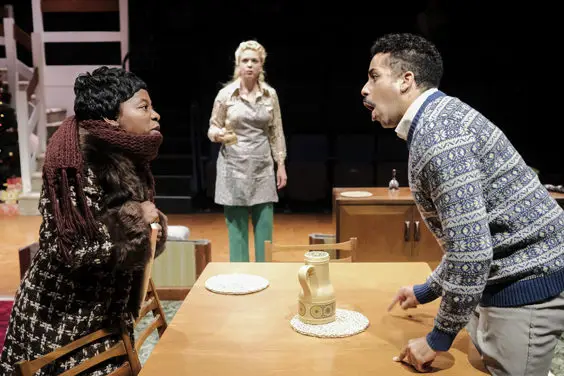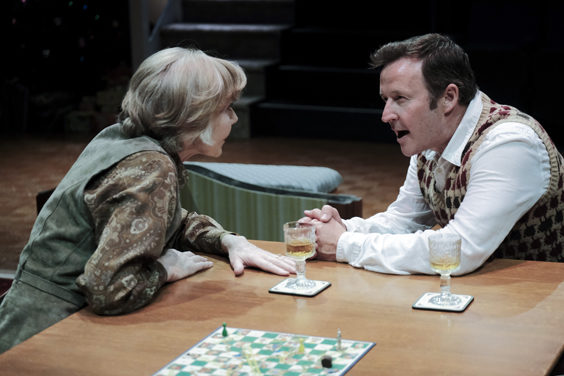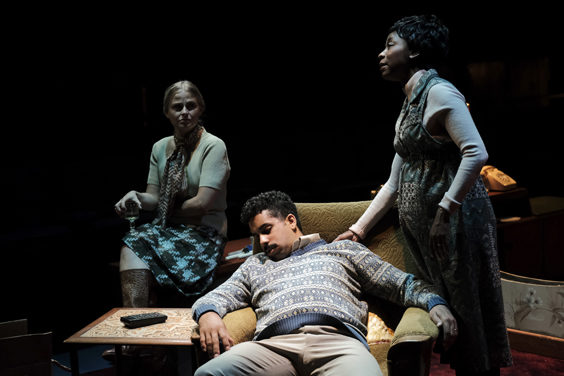Season’s Greetings – Review – Stephen Joseph Theatre, Scarborough
By Eve Luddington, July 2019
Alan Ayckbourn wrote his first play 60 years ago and this year he’ll premiere his 83rd. I’d lay bets that he’s not only the most prolific but also the most enduring playwright of our times, in the UK certainly and perhaps globally too.
There’s a very good reason for that: any Ayckbourn play is guaranteed to make for an excellent evening’s entertainment. He’s a master of theatre – as writer, director, designer and technician.
He premieres almost all his plays in the intimate Stephen Joseph Theatre-in-the-Round, Scarborough. And yet, every time I’ve been there over the past 10 years or so, the auditorium’s rarely been full for an Ayckbourn play and the average audience member looks well over 50 years old.
Ayckbourn wryly comments, in an interview for the Season’s Greetings programme, ‘If you have a long career in the arts, be prepared to go in and out of fashion quite a bit as people’s tastes change and perception of you alters.’
“Family who would be better staying apart”
It looks to me as if Ayckbourn’s plays have been out of fashion for some time with younger Yorkshire audiences. They’re missing out. Ok, so most of the plays are tragic-comic domestic dramas predominantly involving British middle-class suburban characters. So are some very popular TV series, Fleabag, for example. Many of the plays, Season’s Greetings among them, present insensitive men and long-suffering women. So does Love Island.
Whatever your age, if you’re interested in theatre but have never seen an Ayckbourn play, please do! This revival of Season’s Greetings is classic Ayckbourn and directed by him.
It’s 1979. We’re in the home of Neville and Belinda Bunker; hall, sitting room and part of the dining room all laid out before us – in the round. A Christmas tree and pile of presents are positioned at the bottom of the stairs. Off-stage are the excited children – who are never seen. The action starts on Christmas Eve but, really, it could be the start of any festive season which brings together, year after year, family who would be better staying apart: when it ends in the early hours of 27th December, we know why.
“Creates havoc”
Ayckbourn sows his dramatic seeds carefully to establish the characters and the situation. His characters are fallible human beings, rarely malevolent, but always driven eventually beyond their capacity to cope. As in many Ayckbourn plays, the structure is predictable but the plot, never – and never seems contrived because the ground has been so carefully laid. The result is a painful, hilarious family catastrophe.
Neville, a gadget freak, and his friend, Eddie, laze around while Belinda hosts, and Eddie’s highly pregnant wife tries to get her children to sleep. Neville’s alcoholic sister is making the meal; her husband, Bernard – a doctor – brings regular reports from the kitchen of one mishap after another as he tries to prepare for his annual Boxing Day puppet show ‘for the kids’ and avoid full-on confrontation with Uncle Harvey. Harvey, a security guard who expects everyone outside family to be a thief or murderer, keeps a knife strapped to his calf and has bought all the children toy guns for Christmas.
Meanwhile, Belinda’s unmarried sister, Rachel, has invited a male friend, Clive, to stay. ‘You always need a newcomer to represent the audience,’ says Ayckbourn. As well as needing information, a newcomer alters dynamics and, in Season’s Greetings, Clive’s presence creates havoc which changes lives and nearly leads to death.
“Poignant determination”
Ayckbourn’s direction is detailed and meticulous. He has also designed the jolly music accompanying scene changes, and other sound effects which, by the way, contribute significantly to plot development.
It’s a highly accomplished cast. Most of them have been in his plays before and know exactly how to produce the intensity his tragi-comedy thrives on. Bill Champion plays Harvey with a Cockney bonhomie which humanises the character’s bigotry. Leigh Symonds is a fervent Bernard, the doctor who takes himself so seriously it’s laughable: his embarrassingly bad puppet show, a highlight. Belinda’s love speech to her husband is managed with poignant determination by Frances Marshall and his total dis-engagement is played all too convincingly by Matt Addis as Neville.
Needless to say, the audience was highly engaged. We love to laugh at other people’s misfortunes, even as we understand their poignancy. There, but for ‘the grace of God’…











